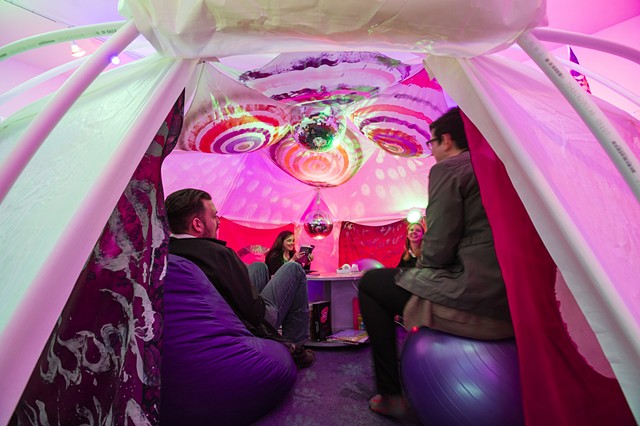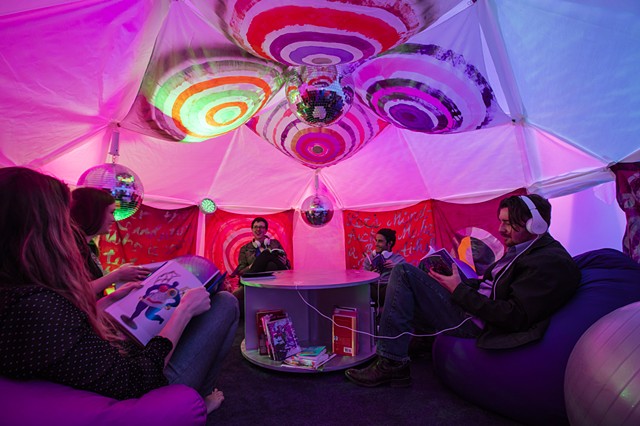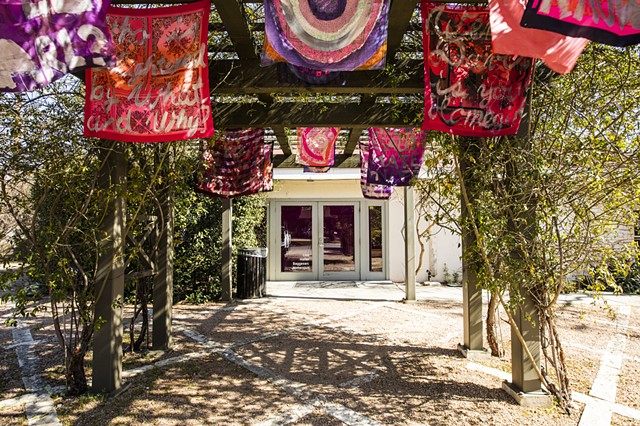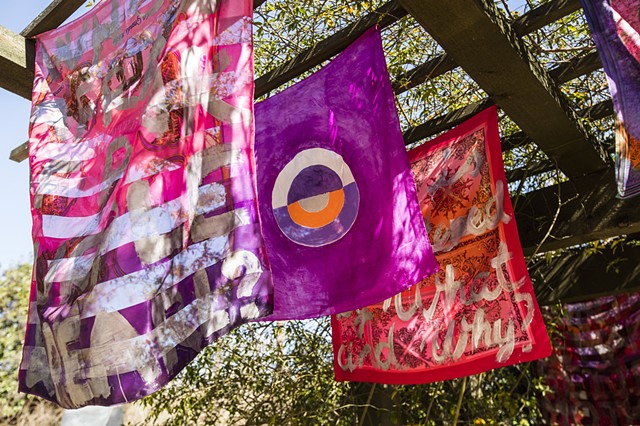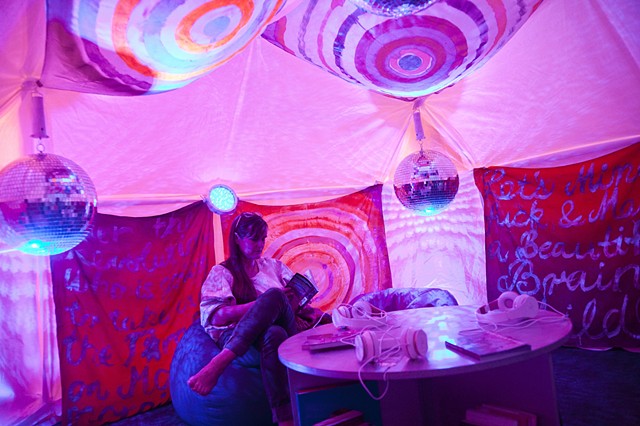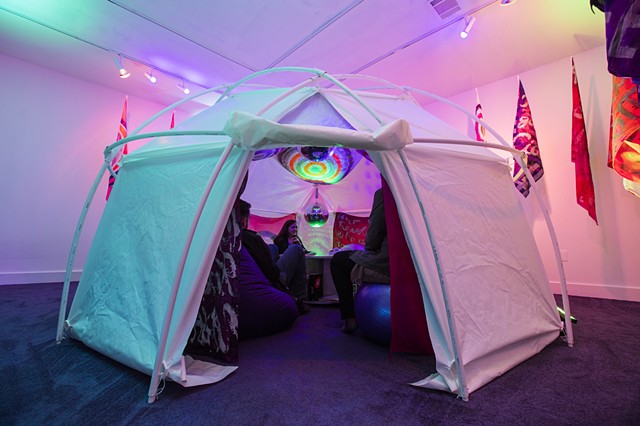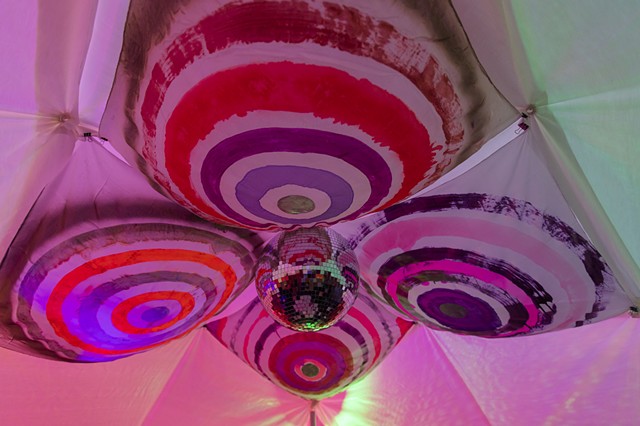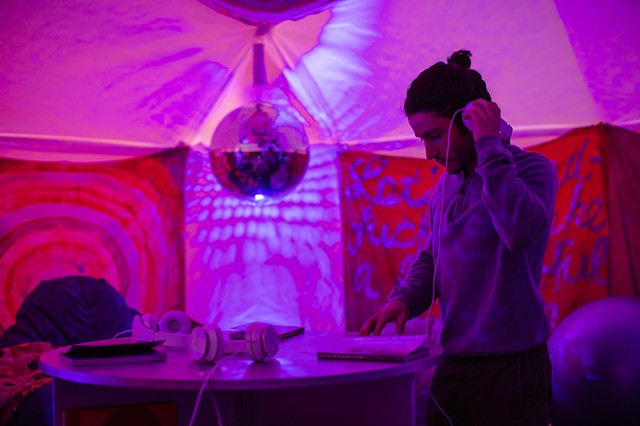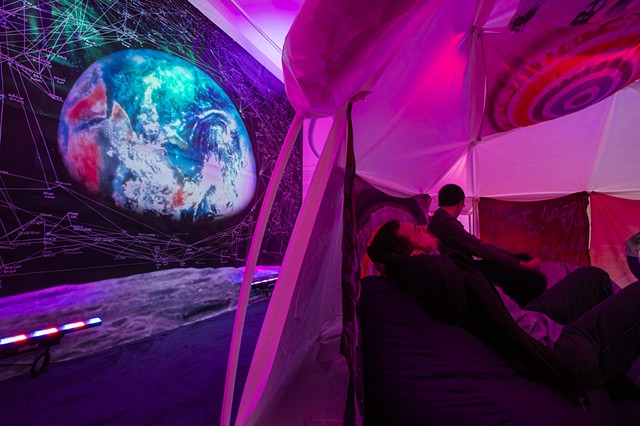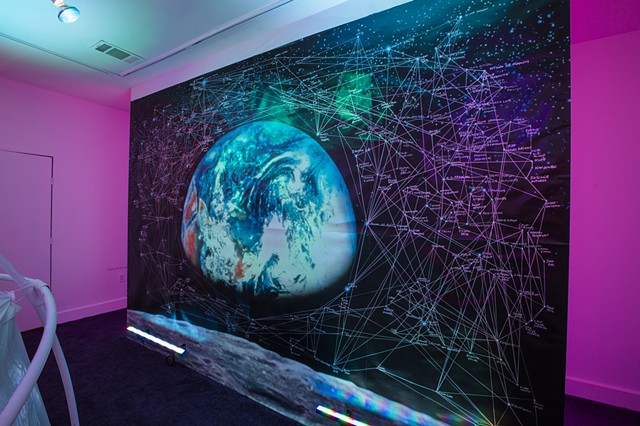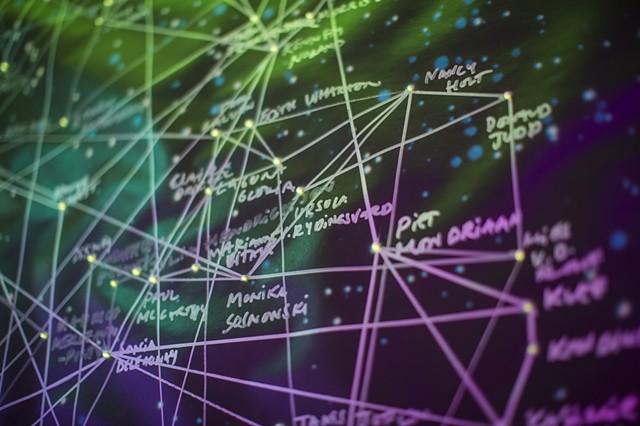LISE HALLER BAGGESEN: MOTHERNISM | The Contemporary Austin | 2016
LISE HALLER BAGGESEN: MOTHERNISM
February 13 – May 22, 2016
On view at The Contemporary Austin's Gatehouse Gallery at the Betty and Edward Marcus Sculpture Park at Laguna Gloria
This exhibition is organized by Julia V. Hendrickson, Registrar & Assistant Curator for Special Projects, with text also by Hendrickson.
CURATORIAL STATEMENT
"If Punk is dad […] Disco is your eternal mother, into whose pulsating bosom you can always return…" [1]
—Lise Haller Baggesen
Lise Haller Baggesen (Danish, born 1969 in Aarhus; lives and works in Chicago) opens her book Mothernism—a potent, purple object edged in the crisp silver of a fresh Wrigley’s gum wrapper—with an account of a long drive on the German Autobahn, followed by an ode to Donna Summer’s sultry disco style and lyrics from David Bowie’s 1979 song “Fantastic Voyage.” 1979 was the International Year of the Child, the heyday of disco, and for Baggesen, the touchstone for her multifaceted project, situated (as she describes it) at “the intersection of feminism, science fiction, and disco.” [2] At The Contemporary Austin, Baggesen presents Mothernism in a new, site-specific iteration, the artist’s first solo museum presentation of this project and her first exhibition in Texas.
Mothernism developed from the artist’s ongoing attempts to organize her thoughts on motherhood in history, music, art, and personal experience—or, in her words, to “locate the ‘mother-shaped’ hole in contemporary art discourse.” [3] Initially, this interactive project was conceived as a series of essay-letters written (and then read aloud) by one of Baggesen’s artistic alter egos, Queen Leeba—an amalgam of “Donna Summer and a proto-feminist, Scandinavian love goddess” [4]—and addressed to her children, sister, and mother. Working through this alter ego allowed Baggesen the freedom to use writing as an integral part of her visual studio practice: “[T]he writing informed the work while it was being made and dared me to go places where I wouldn’t have [g]one.” [5]
First exhibited in 2013 as an audio-visual installation that incorporates recordings of the artist (as Queen Leeba) reading the letters aloud, and subsequently published as a book of the same name in 2014, the Mothernism project has been presented in venues nationally and internationally before evolving into its Austin iteration. Baggesen tailors the installation to each exhibition space in the spirit of the project’s nomadic, open-ended conception.
At The Contemporary Austin's Gatehouse Gallery at the Betty and Edward Marcus Sculpture Park at Laguna Gloria, Mothernism is a safe haven replete with a cozy tent, spinning disco balls, plush purple carpet, comfortable seating, a library, and slowly changing, colorful lights: a nod to the bright pop of midcentury Danish interior designer Verner Panton as well as snoezelen rooms, a Dutch therapy technique from the 1970s. Baggesen’s welcoming, multipurpose room also contains vibrant silk banners painted with political slogans and revisionist Color Field works—an homage to abstract pioneers such as Helen Frankenthaler, Hilma af Klint, and Kenneth Noland—as well as a rhizomic wall drawing in silver ink over a photographic image of Earth as seen from space. The effect of lying inside the tent, viewing our planet from the vantage point of the moon through a scrim of colorful flags, is otherworldly: Bowie’s 1969 song “Space Oddity” comes to mind. Baggesen situates herself as an intermediary between the museum and the visitor, in that she offers up the environment she has created to be used by the public as the need arises. Indeed, visitors are encouraged to use the space as a platform for activities from book browsing to breast feeding, political debates to poetry readings.
Entering this space evokes the experience of stepping into a painting, informed by Baggesen’s formal training as a figurative painter in the Netherlands in the 1990s (she studied at the Rijksakademie from 1996–1997 under painter Luc Tuymans). Rather than solely addressing the figure in painting, Mothernism challenges Greenbergian ideals of “flatness” by inviting the viewer into her painting-as-installation, a figure/ground relationship so upended as to become participatory, or relational. As art historian Claire Bishop argues, “Participatory art demands that we find new ways of analyzing art that are no longer linked solely to visuality, even though form remains a crucial vessel for communicating meaning.” [6]
Mothernism will also have a new, Austin-specific component, to be released on March 8, International Women’s Day. In the spirit of the museum’s goal to commission new work, and on the occasion of the centennial of the Driscoll Villa at Laguna Gloria, The Contemporary Austin presents a new audio text from the artist: The Mothernist’s Audio Guide to Laguna Gloria. Based on research related to the history of the Villa’s original designer and owner, Clara Driscoll, and Laguna Gloria’s architecture, grounds, and sculpture—and incorporating Baggesen’s signature mélange of art history, pop culture, politics, and music—this walking guide offers an additional participatory component, inviting visitors to uncover forgotten stories and explore Laguna Gloria and its artwork in new ways. As audio-installation, epistolary manifesto, and party-as-form, Mothernism is one twenty-first-century feminist’s affectionate call to arms.
[1] Lise Haller Baggesen, “Outro,” Mothernism (Chicago and Oak Park, Illinois: Green Lantern Press and Poor Farm Press, 2014), 136.
[2] Baggesen, “UMAMI,” Mothernism, 17.
[3] Ibid.
[4] Baggesen, “Lise Haller Baggesen’s Mothernism: Extended Web Exclusive Interview,” with Matt Morris, Newcity, 16 October 2014.
[5] Ibid.
[6] Claire Bishop, Artificial Hells: Participatory Art and the Politics of Spectatorship (London: Verso, 2012), 7.
A MOTHERNIST AUDIO GUIDE TO LAGUNA GLORIA
Listen to the full Audio Guide via ContemporaryATX on SoundCloud. A reading PDF of the Audio Guide text can be accessed here.
PRESS
Loveless, Natalie, ed. “Maternal Dialogues: Loveless & Baggesen in Conversation.” In New Maternalisms: Redux. (Edmonton, Alberta, Canada: Department of Art & Design, University of Alberta, 2018), 158–219.
Donner, Christa. “Mothernism: An Interview with Lise Haller Baggesen.” Temporary Art Review. May 4, 2016.
Marino, Rebecca. “Q+A with Lise Haller Baggessen.” Conflict of Interest. February 26, 2016.
Frank, Priscilla, et al., “The 21 Exhibitions You’ll Be Talking About Next Year.” Huffington Post. December 29, 2015.
INSTALLATION VIEWS
